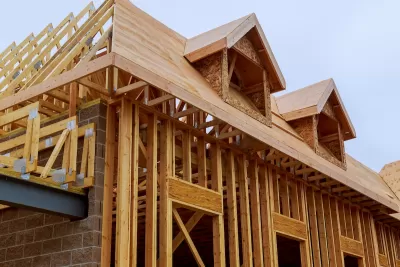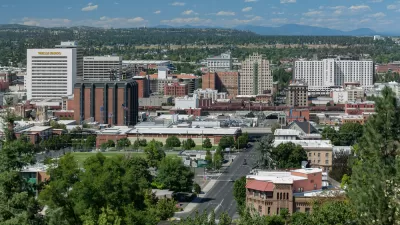An affordable housing developer explains the hurdles to building more housing for middle-income households.

In a piece in Greater Greater Washington, Patrick McAnaney explains the challenges faced by affordable housing developers in trying to build for middle-income families.
According to McAnaney, “In expensive cities, middle-income housing developments—new homes and apartments that residents earning about the median family income can afford—simply cannot win the competition for land.” Because land is a commodity, lots will be sold to the highest bidder, and developers will outbid each other to ensure the sale, passing on the cost to future tenants or buyers.
“There is, of course, far more to this story. Zoning laws, transportation networks, the advent and dominance of private vehicles, and many other factors affect the geospatial layout of cities,” McAnaney concedes, but market competition largely explains the clustering of similar uses common in U.S. cities.
McAnaney explains how competition from different housing developers also drives up the cost of land and thus rent costs. Ultimately, when the “highest and best use” is defined as the one that brings in the most revenue, “This ‘highest and best use’ dynamic largely explains why developers are not able to produce more middle-income housing in urban areas. Even relatively small differences in rents can cause huge differences in land value.”
FULL STORY: Why no one’s building middle-income housing in American cities

Planetizen Federal Action Tracker
A weekly monitor of how Trump’s orders and actions are impacting planners and planning in America.

Congressman Proposes Bill to Rename DC Metro “Trump Train”
The Make Autorail Great Again Act would withhold federal funding to the system until the Washington Metropolitan Area Transit Authority (WMATA), rebrands as the Washington Metropolitan Authority for Greater Access (WMAGA).

The Simple Legislative Tool Transforming Vacant Downtowns
In California, Michigan and Georgia, an easy win is bringing dollars — and delight — back to city centers.

The States Losing Rural Delivery Rooms at an Alarming Pace
In some states, as few as 9% of rural hospitals still deliver babies. As a result, rising pre-term births, no adequate pre-term care and "harrowing" close calls are a growing reality.

The Small South Asian Republic Going all in on EVs
Thanks to one simple policy change less than five years ago, 65% of new cars in this Himalayan country are now electric.

DC Backpedals on Bike Lane Protection, Swaps Barriers for Paint
Citing aesthetic concerns, the city is removing the concrete barriers and flexposts that once separated Arizona Avenue cyclists from motor vehicles.
Urban Design for Planners 1: Software Tools
This six-course series explores essential urban design concepts using open source software and equips planners with the tools they need to participate fully in the urban design process.
Planning for Universal Design
Learn the tools for implementing Universal Design in planning regulations.
Smith Gee Studio
City of Charlotte
City of Camden Redevelopment Agency
City of Astoria
Transportation Research & Education Center (TREC) at Portland State University
US High Speed Rail Association
City of Camden Redevelopment Agency
Municipality of Princeton (NJ)





























